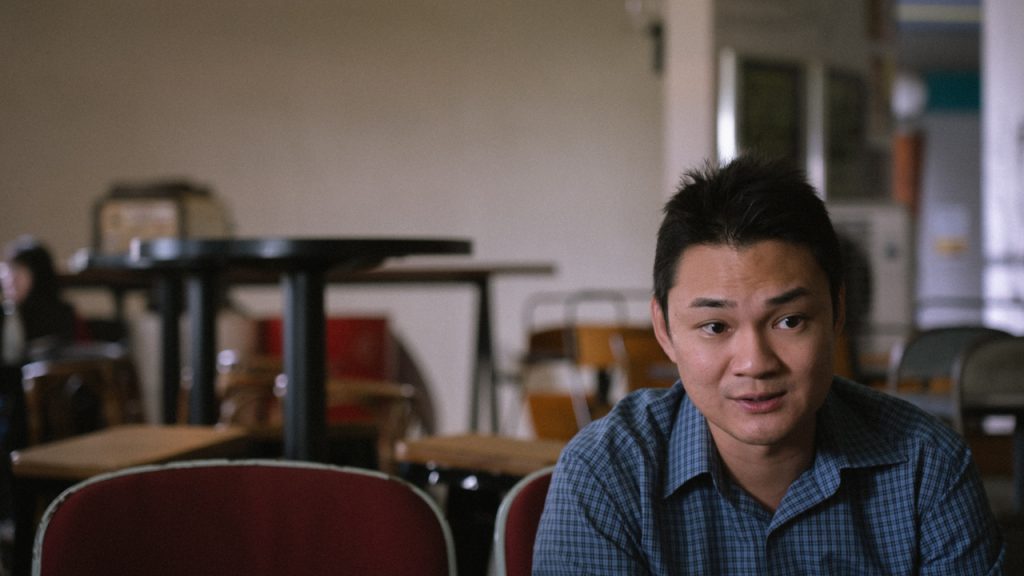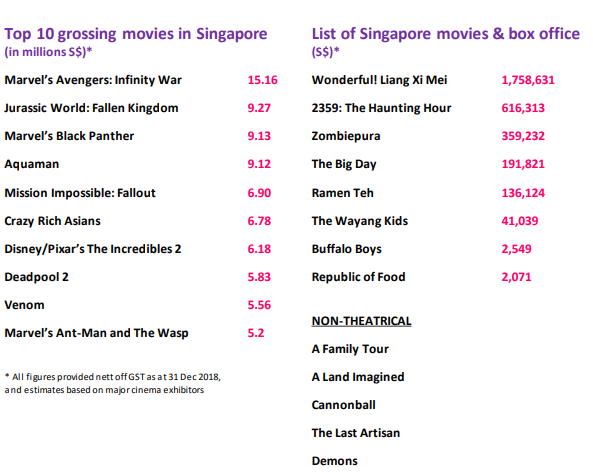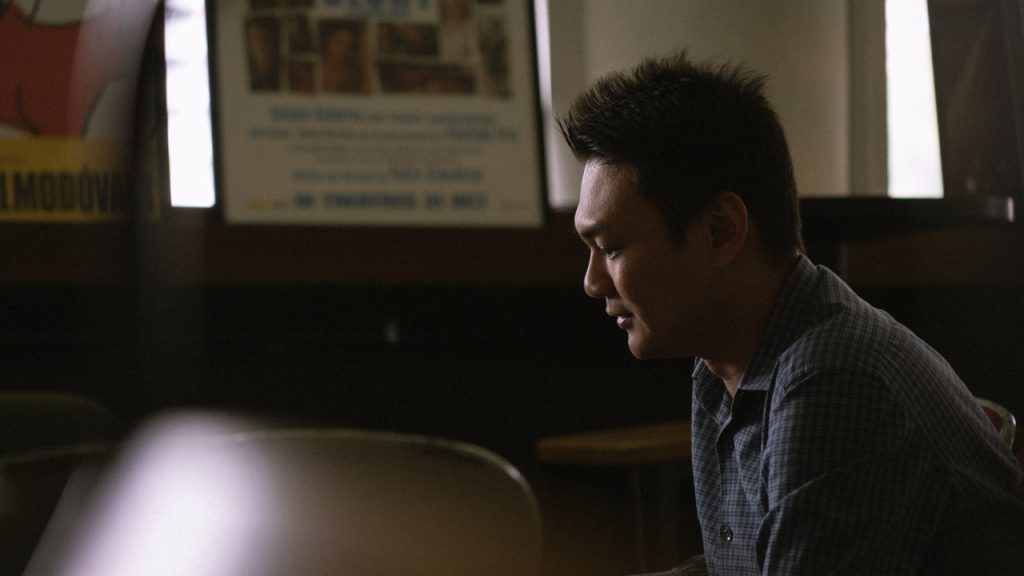So when I ask him about his favourite local films, I expect something from the oeuvre of Eric Khoo, Boo Junfeng, Kirsten Tan, or Singapore cinema’s latest star, Anthony Chen. I’m caught off-guard when he says, matter-of-factly, “Jack Neo’s Money No Enough”.
Even though “it’s not very sophisticated”, Vincent muses, “Jack Neo had his finger on the pulse [of Singapore]. When it came out in 1996, it was a big deal, way bigger deal than when I eventually saw Eric Khoo’s 12 Storeys.”
But it took a while for Vincent to develop this egalitarian sense of cinema, so to speak.

Despite the rosy statistic that each person in Singapore went to the movies an average of 3.9 times in 2018—one of the highest rates of cinema attendance in the whole world—no mainstream cinema chain was willing to take the financial risk of screening Vincent’s movies.
After all, according to a report compiled by the Singapore Film Commission, all of the top 10 grossing movies in Singapore are big-budget Hollywood movies. Moreover, with the exception of Crazy Rich Asians, the movies on the list are sequels or franchises, largely of the Marvel or DC superhero variety: Avengers: Infinity War, Black Panther, Aquaman …

Vincent, therefore, had to resort to four-walling: a practice in the film industry in which a distributor rents a movie theatre to screen its movies. As he recounts this phase of Anticipate Pictures, Vincent shakes his head, mutters, “Oh my goodness,” and finally, with a self-deprecating laugh, says, “I was renting the screening room space at The Arts House. It was very costly. That’s not the way to do it because you’re burning the candle on both ends [incurring expenses in film acquisition and hall rental at the same time].”
Reflecting on that tumultuous period, Vincent says, “I don’t blame the cinemas. I’ll be honest: I was very naïve when I started … You can’t sustain a business like that. You’ve got to balance your own cinephile inclinations and your financial responsibilities.”
Thankfully for ardent independent film-goers here, Vincent persevered through his early fumblings and eventually “learnt about the industry the hard way,” as he puts it. Vincent’s experience is a stark reminder that, in every business, passion has to be tempered by some sense of financial realism. Today, Vincent is more mindful of the market and the diversity of taste, and focuses on movies that are both artistically accomplished and more commercially viable.
With the maturing of his distribution strategy, independent venues like The Projector have become staunch supporters of Anticipate Pictures. The company now operates on the revenue-sharing model with The Projector, so Vincent can finally breathe a little easier—even though he admits that he is still struggling to keep his company afloat.

This is because, unlike Martin Scorsese, who decries Marvel movies as “not cinema”, Vincent’s “cinephilic inclinations” don’t stem from a misplaced sense of being superior to the “ordinary Singaporean”, in the words of a spokesman-or-maybe-not. In fact, Vincent does not distinguish between highbrow or mainstream cinema.
“I don’t work with an ‘us’ or ‘them’: I don’t think there’s a group of people who will never come and see my films,” Vincent emphasises.
“I’m not under the impression that my films will be popular with everybody and anybody. But I feel that one of the issues is the lack of exposure. People are not exposed to the idea that there are different kinds of films.”
Vincent likens this lack of exposure to growing up eating just one type of food. If chicken is the only meat you’ve been eating your whole life, he reasons, you wouldn’t know you can eat snails, for example, let alone whether you like consuming molluscs.
“Taste can be developed. It’s not a matter of social status.”
Vincent’s assertion is at odds with the notion in sociology that taste is determined by high SES people as way to reproduce and reinforce social divisions. At this point, I may have unconsciously let some scepticism creep into my face because he declares, “I’m from Yishun, I’ve lived in a HDB all my life, I went to neighbourhood schools, yet I can still develop such a love for—quote unquote—fine arthouse cinema.”
“We have to completely remove the idea that art is for the upper class, the privileged.”
At this point, I’m convinced. If an Yishun boy can learn to appreciate independent film, then anybody can. But, in the first place, how on earth did an Yishun boy fall into the world of arthouse cinema to start a film distribution company?

“That film was the one that got me on my cinephile journey,” Vincent whispers reverentially.
Just a second later, I involuntarily burst out laughing at the irony when the film distributor confesses that he was watching it on “a [pirated] DVD of the film that somebody had slipped his family”.
Vincent explains, “Back then, it was really hard to find movies that were not commercial or blockbusters, so I pirated a lot.”
“I would go to JB and I grew so gam [chummy] with the people who sold the pirated DVDs that they would give me package deals. It’s not something I hide. It’s definitely one of the reasons why I love film. I wouldn’t be able to love film as much if I had stuck to the regular diet of commercial films.
“Through my contacts and clandestine methods of procuring films, I devoured things like LGBTQ cinema, German films, French films …”
Fuelled by his fervour for film, Vincent decided to head to film school at Los Angeles to study movie-making. However, during the process of completing his final year project, he realised he didn’t enjoy being on set; he would rather be on the other side of the screen.
While his classmates made movies and found internships at production houses, Vincent, wanting to find out “what happens between finishing a film and when it finally is projected on the big screen”, knocked on the doors of film distributors. He secured internships at IFC Films, a leading distributor of independent and foreign films, and, at the opposite end of the spectrum, Universal Pictures International, the studio behind pictures like Despicable Me and the Fast & Furious franchise.
During the weekends, Vincent continued devouring movies—this time through perfectly legal means.
“I completely shed the piracy habit once I went overseas,” Vincent declares, “Because in America, there was no real issue of censorship. I can easily find movies on iTunes, or I can go to Best Buy or Blockbuster or something and rent the film.”
Eventually, Vincent’s experiences in America—cutting his teeth at prestigious film distribution businesses, and immersing himself in the vibrant, censorship-free film-going culture—gave birth to Anticipate Pictures, the film distribution company Vincent runs by himself from his home office in Yishun.
Why Singapore, though? For someone as movie-mad as Vincent, it seems counterintuitive to leave Hollywood and return to Singapore.
Because while Vincent is completely enamoured with movies, his bond with Singapore is stronger.
“I didn’t have a desire to work in the US. I was more interested in finding out how to help the scene and the film industry here.”

Watching a “period lesbian film”—how Vincent describes Portrait of a Lady on Fire, a film Anticipate Pictures brought in and will be screening at the upcoming Singapore International Film Festival—or a documentary about life during the Syrian war is also, according to Vincent, an act of resistance that gives suppressed and alternative voices the space to resound.
“It’s everything that I want to espouse in my company: a female voice, voices not heard. I want to give a voice to these kinds of films.”
More pertinently, Vincent thinks that being exposed to and getting an education in film (and, more broadly, the arts) is integral to raising a generation who can sensitively interpret the sort of images and narratives we are being bombarded by today: memes, doctored videos, “news stories” substantiated by images plucked from Google.
“We cannot drop the ball on raising a media-literate generation. How do we teach and give them the skills to interpret visual images, to read beyond the flashing content in front of them?”
It’s a rhetorical question, but Vincent has the answer ready.
“It’s about education, meaning that we don’t just look at the arts as a bonus add-on, but to give that kind of exposure from young. For example, every year, the French put together a list of movies for secondary school kids in their country to watch. And it’s not only French films on the list. Ilo Ilo was on it one year.”
The list is not only lip service, Vincent adds.
“The French actively try and bring the school-going children to the cinema to watch these films. That’s what I mean by taking the arts and culture in education seriously.”
“I would really like IMDA to start putting in more effort into the education side of things. MOE and NAC should be part of this conversation too. I think everyone could work together to develop Singaporeans into a more well rounded, media-literate population.”

Censorship of the arts in Singapore has always been a fraught issue. Regardless of sector—literary, theatre, film, dance, or music—there is always something someone higher up can find objectionable.
Some brief examples:
In 1992, playwright Tan Tarn How’s The Lady of Soul and Her Ultimate ‘S’ Machine was so heavily mauled by the police (which was in charge of media censorship then) that Tan felt “very depressed” when he heard the news.
Filmmaker Tan Pin Pin’s 2013 film To Singapore With Love was banned for “undermining national security” by interviewing political exiles about their feelings towards Singapore.
Poet Koh Jee Leong was so frustrated by the state apparatuses’ heavy-handed approach to censorship and control of the arts that, in 2015, he called on artists here to refuse working with them any further.
And the Watain ban just earlier this year is still fresh in our minds.
If you think all these examples are ridiculous, wait till you hear this: disco dancing was banned in Singapore in 1973.
Yes. I repeat. Dancing in discos was banned.
This was not the result of a strange, anachronistic, Puritanical fever that swept through the nation only temporarily. The resistance to dancing in bars persisted till 2001, when then-Chairman of the Remaking S’pore Committee, Dr Vivian Balakrishnan, commented:
“Some people will die as a result of liberalising bar-top dancing.”
Vincent is lucky: out of the 36 films that he has brought in so far, none of them have been cut. His closest brush with the censorship board is when IMDA “made a big deal about one utterance of JFC” in Matangi/Maya/M.I.A, a documentary about the eponymous singer.
“‘JFC’ stands for—” Vincent begins to explain, and I hurriedly assure him I am familiar with the initialism.
“In IMDA’s terms, ‘JFC’ is blasphemy, so they would never allow it under any circumstance. But I feel that most people would understand it’s an exclamation and not an insult towards the religion.”
I get where Vincent is coming from. When I accidentally stub my toe on my bed frame (an all too common occurrence, sadly), I reflexively yell, “Shit!” even though I don’t mean to express any defecation. Like the contentious ‘JFC’, this outburst of ‘shit’ is simply an empty cry.
This inability of our censorship boards to exercise more empathetic or flexible thinking is why Vincent is so frustrated with the classification guidelines here. It’s not that he wants an anarchic free-for-all industry where there are no ratings at all. He just hopes for the institutions here to treat the Singapore population like adults capable of making judgments for themselves.
“Yes, most major democracies have rating systems,” Vincent acknowledges. “But they are guidance driven. So they will slap an advisory but they will not force people below a certain age not to see it.”
“For example, in America, anyone 17 and under can still see R-rated films in cinemas provided they are accompanied by a guardian or adult above 17. Many of these films are M18 or R21 in Singapore which flat-out prevents people below that age to access the films.”
“I think we can do better in adopting that kind of rating because if I, back in the early 2000s, was able to access a lot of films illegally, what about now? People don’t even have to download anymore. It’s all streaming out of boxes.”
Even though Vincent feels like he is fighting a Sisyphean battle at times, he refuses to give up. Sometimes, he tells me with a mixture of defiance and resignation, he will submit a film for assessment even though he knows that the chances of it getting passed by the censorship board are slim to none.
“If I don’t do it, then nobody else will keep pushing the boundaries. I think it’s important that someone keeps pushing the boundaries of the Board of Film Censors. Otherwise they will never know—they will keep getting these safer films and just pass them. Nothing will change.”
“And this country will go on operating on automatic.”

It’s a tiny sliver of hope, but a fierce one.
“Singapore can become a cultural powerhouse,” Vincent pronounces. “But it requires conviction from someone or a group of people who are really knowledgeable and invested in this, who can wield power productively to help shape policy for the long term. Otherwise we’ll never become the cultural powerhouse that we so desire.”
We can’t be a South Korea. We can’t be a Japan.
Until that day comes, Vincent will go on fighting for the existence of Anticipate Pictures.
Even though his parents “still harbour hope that [he] will eventually give this up and join IMDA or something”. Even though “it’s just so hard to sustain something like this, financially”. Even though every time he does an interview, like the one we’re having now, he would say, “maybe the next year I won’t be doing this anymore”.
But he will.
I ask him why. Vincent takes a very long pause, groping for words that can capture the powerful swell of emotions in him.
Then he exhales in one breath: “One of the greatest things about running this company is that it’s incredibly emotionally fulfilling. It doesn’t pay the bills but … I wouldn’t give this up. I would like to stay on and do this for as long as I can. For the rest of my life.”
Thinking back on this moment, I needn’t have asked him why. After all, his raison d’être is written in the name of his company.
Anticipate Pictures: Vincent is anticipating the day when Singaporean audiences grow an appetite for boundary-pushing films, and, in the process, help develop Singapore’s film industry so that it can rival that of cultural capitals worldwide.

Joel and Clementine are sitting in Joel’s car. From the car stereo floats a recording of Clementine’s voice bitterly expressing how much she hates Joel. Yet, to their knowledge, they had only met hours ago at a train station in Montauk. Eventually, they realise they were once lovers, but had erased each other from their memories after a painful breakup.
Cheeks wet with tears, they look helplessly at each other, the fledgling promise of love already scarred by these ghostly memories. They know they will hurt each other, deeply. But still, they tell each other: “Okay”.
Okay. You will hurt me. But I will not give up on you.
Substitute Vincent for Joel and the Singapore film industry for Clementine and you have an encapsulation of Vincent’s relationship with—and undying passion for—what he does.
Despite his tussles with censorship and opaque bureaucratic mazes, financial worries, a cinema-going audience yet to be weaned from Marvel blockbusters, and a belief that Singapore is far from being a cultural powerhouse like South Korea or Japan, Vincent “wouldn’t give [his film distribution business] up” for anything else.






